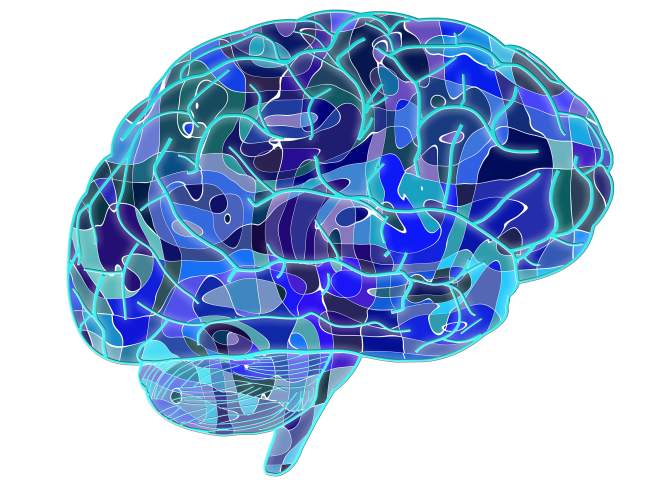Discovering The Role Of Sleep In Brain Development, Learning And Health
Despite the universality of sleep, the purpose of this biological imperative remains somewhat shrouded in mystery.
January 18, 2018

Brain puzzle with cool colors illustration

A common phenomenon is observed by people who venture away from their homes shining with artificial light sources to camp under the stars: when the sun sinks below the horizon and a chorus of crickets lulls from the encroaching dark, they find they get sleepy earlier than they typically would in the modern world of screens and street lights.
The urge to sleep can be thrown into stark relief when there are fewer distractions from its call and less light to keep it at bay. This drive is not unique to campers, or humans in general; eventually even the crickets will quiet and turn-in. Most animals require some type of sleep, and it helps humans and other creatures maintain cognitive function, consolidate memories and regulate emotions.
Despite the universality of sleep, the purpose of this biological imperative remains somewhat shrouded in mystery, explained Stephanie Jones, assistant director of the University of Wisconsin-Madison Institute for Sleep and Consciousness. She discussed the science of sleep in a Sep. 7, 2016 lecture for the Wednesday Nite @ the Lab lecture series on the UW-Madison campus, recorded for Wisconsin Public Television’s University Place.
“It’s almost an embarrassment in biology… we have come so far, but we can’t answer this very simple question: Why do we sleep?” Jones said. “If it’s this important, we should know why. Nobody agrees on the answer.”
One possibility is that sleep is the price of learning. The synaptic homeostasis hypothesis postulates that the brain takes in a large amount of information during waking hours, strengthening synapses in the brain. Just as muscles grow fatigued after a long workout, the brain eventually tires after consuming available resources and capacity. Sleep not only offers a period of lower activity, but also permits neurons to filter important information the brain has absorbed from a cacophony of sensory inputs.
Healthy sleep patterns fall into multiple stages that successively deepen. One stage, slow-wave sleep, is the deepest and the most vital to resetting mental state and feeling refreshed upon waking.
A lack of slow-wave sleep, sometimes caused by disorders such as obstructive sleep apnea, is associated with a host of adverse effects, including poor task performance, behavioral problems and even health issues like Alzheimer’s among older adults. When the brain does not get a chance to rest, it is less able to regulate plasticity, or the ability to modify its structure and function following the experiences of the day.
“I’m gonna argue that sleep is incredibly important. If it weren’t, we wouldn’t spend about 35 percent of our time asleep,” Jones said. “If you live 77.8 years, you will spend 27 years sleeping.”
Key facts
- REM (rapid eye movement) sleep is often perceived as deep sleep, but this state only makes up about 25 percent of a healthy adult’s sleep cycle and is marked by nearly as much brain activity as a state of wakefulness.
- The regions of the brain that work the hardest during waking hours also experience more intense sleep. A person who spends many hours driving will activate the posterior motor cortex, which will exhibit more slow-wave (also called delta wave) activity than less activated parts of the brain upon sleeping.
- While humans are adapted to sleep over a single, longer period, midday naps can provide performance improvement in all kinds of learning, including motor skills and information retention.
- There are limits to the amount of information and stimuli a brain can absorb before it requires sleep to continue optimal operation. While wakefulness may continue after the brain reaches this point, cognitive function decreases and the parts of the brain that have been working the hardest can experience off periods of localized sleep.
- The human brain develops from back to front over the course of childhood and young adulthood. For this reason, young children exhibit the bulk of their slow-wave sleep patterns at the back of their brains, while these delta waves occur in the front of an adult brain.
- Brain scans of sleeping children who snore or exhibit signs of obstructive sleep apnea may not exhibit the signs of disordered sleep that would appear in those of adults with similar conditions. Children who experience disordered sleep related to breathing will generally not rouse with the frequency of their adult counterparts, but can exhibit problems related to learning, behavior and long-term brain development as a result of their diminished slow-wave sleep.
- Some animals, including dolphins and many species of birds, sleep unihemispherically. This process is when half of the brain enters the sleep state. It allows aquatic mammals to keep moving in the water, even as they rest, and permits birds to remain semi-alert to avoid predators or rest while flying long distances for migration.
- Even hibernating animals require sleep. Although hibernation typically includes greatly reduced levels of activity, slowed breathing and heart rate, and lower body temperature to conserve energy during colder periods, animals need to come out of the hibernation state to sleep. They may even experience sleep deprivation when they emerge.
Key quotes
- On the relationship between learning and sleep: “We can learn during the day, but sleep optimizes it. The harder you’re awake, the harder you sleep, right? And if you do a lot of learning during the day, your brain will sleep harder, more intensely. And there’s nothing you can do about it. Biology drives that, so if you stay awake, which I think is equivalent to learning, you will sleep harder.”
- On the decrease in brain functions absent sleep: “Waking is associated with synaptic strengthening. This is learning, right? Without sleep, the brain becomes saturated, and this learning can no longer happen. And also, when you get saturated, sleep becomes absolutely imperative. So you may be awake, you may be driving, but, in fact, there are parts of your brain that are saying, ‘Oops, can’t do it anymore.’ That’s the price of plasticity. So, sleep downscales synapses leaving what’s important, and it’s in this way that sleep improves memory.”
- On the intensity of slow waves in a sleep deprived brain: “If you are sleep deprived, you don’t really increase the duration of sleep when you have a sleep epoch. What you increase is the power or the intensity of sleep, and that is reflected in this very special slow-wave activity.”
- On the downsides of sleep: “Sleep is also dangerous… from the perspective of an animal, right, they put themselves at significant predation risk. I mean, to some extent we do too. And sleep is dangerous for us insofar as it comes at a huge opportunity cost. We can’t do all the things that we want to do to make ourselves successful as a species. … Most of us don’t do reproduction during sleep. We don’t work. We don’t do anything important.”
- On Thomas Edison’s opinion that sleep is a waste of time: “We start invading the night and giving short shrift to sleep. We’re controlling our environment. Some predictions say we now sleep anywhere from one to three hours less. So you can imagine in a place like Wisconsin, when the days are really short, we slept longer. But now we control our environment. We don’t sleep so long. Edison would say that that was a wonderful thing. Do we think he’s right? Probably not, right? … We shouldn’t be giving short shrift to sleep.”
 Passport
Passport











Follow Us